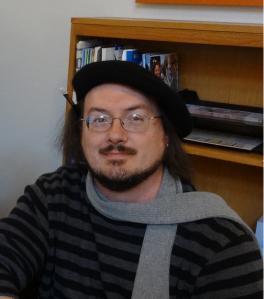Interview with Robert Felthousen, Rogue Community College
Continuing our interview series of reaching out to academic library leaders across the state to facilitate “getting to know” our colleagues… the next interview in this series is with Robert Felthousen, Library Department Chair at the Rogue Community College Libraries in southern Oregon.
Thanks for talking with us, Robert!
1. Tell us a little bit about your work background.

My library career began in 2003, when I interned at the Southern Oregon University library as part of a class project. Apart from that internship, my entire library career has been at Rogue Community College, and I’ve worked in almost every library position here. I started as a circulation volunteer, but my interest was actually cataloging and technical services. I’ve been a cataloging assistant; full-time, para-professional cataloger; circulation services coordinator; and full-time reference and instruction librarian. I was appointed department chair in December 2013.
Prior to 2003, my more notable jobs were repo man (1994-1999), dental assistant (1999-2002), and dental instructor (2001 – present). That’s right, I still teach classes in RCC’s dental assistant program: radiology, and legal and ethical issues.
2. What has been the best thing that has happened to you since you started your position?
I became department chair at the start of a large wave of retirements. Although it was hard to see so many of my friends and mentors leave, it’s given me the opportunity to meet and work with some amazing new peers. Their energy, fresh ideas, and insights have truly been the best thing that’s happened!
3. What would you like Oregon academic librarians to know about you?
I write fiction and poetry as a hobby, and have recently started work on some non-fiction essays. I would love to teach creative writing, not as a new career, but just to share my interest in something I’m very passionate and opinionated about.
4. What is the biggest challenge facing your library in the upcoming year?
Our department website has not substantially changed since the early 2000’s. It’s too large of a project for us to handle independently, and our needs have not been understood by the institution. The library is usually regarded as an academic department (like math or humanities), instead of an essential student service (like registration or financial aid). A well-meaning colleague explained to me that every department feels like they should have a large “bells and whistles” site, linked to the college’s home page; another was certain that students would just find our databases and services with a simple Google search.
We were able to use Google Analytics to prove that students were accessing our site from the main page and not from a Google search; that they use PCs instead of mobile devices to access our site; and that the site does, in fact, receive a lot of use: at the time, the library homepage was the third most-visited college webpage for the month. We’re actively working with the college’s web design team now, so I’m hopeful that we’ll see a new site in 2016. But it has been a challenge!
5. What would you like Oregon academic librarians to know about your institution?
Last year, RCC applied for and received a federal research grant. Titled “SOHOPE: Southern Oregon Health Occupations Poverty Elimination,” this grant will provide support to low-income people in our community. Eligible applicants can use this support for approved healthcare certificates or degree programs, and will receive assistance with job placement after graduation.
I’d also like to brag about Table Rock campus, which just celebrated its 10-year anniversary in October. Most of our career technical programs (such as fire science, EMT, criminal justice, electronics, manufacturing, and diesel technology) are located at this campus. The college recently purchased a neighboring building, which is tentatively slated for a flex technology lab.
6. What does advocacy for academic libraries look like from your perspective as a library director?
Advocacy for the community college library starts with a solid belief that the library is the single most important department on campus. If it isn’t, why not? Work for the day that students come to the library and say, “I can understand why they built a college around this library.” Keep improving everything.
Advocacy is also relationship-building with the faculty. Instructors are your most influential advocates. Instructors should be able to describe your services accurately, and they should want students to use the library. If they don’t care about the library, why would the students?
~ Stephanie Debner, ACRL-OR Vice President – President Elect (2015-2016)
Faculty Librarian
Mt. Hood Community College
stephanie.debner@mhcc.edu